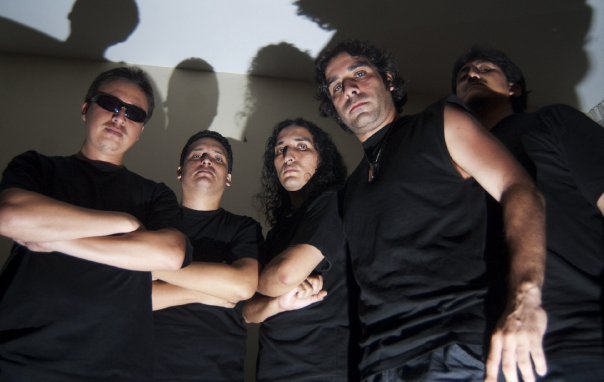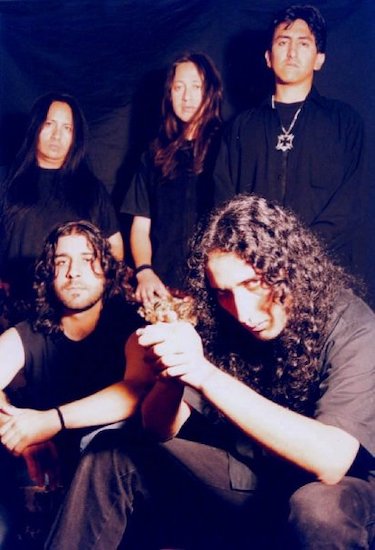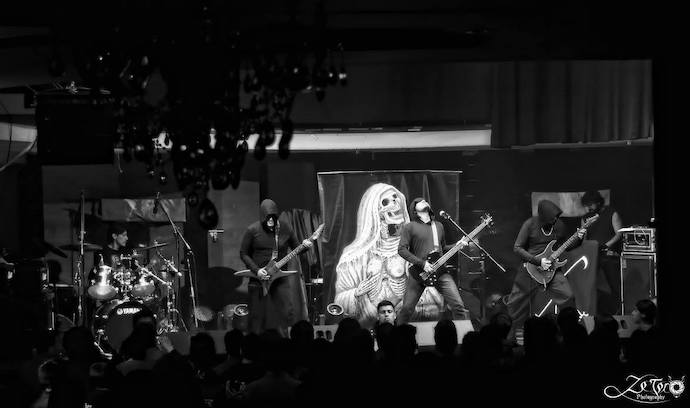(In this new interview Comrade Aleks conversed with Mario and Marco, founders of the long-running Peruvian death-doom band Psicorragia, who are at work on a new album.)
Psicorragia is representative of Peruvian underground. Formed in Lima in 1994, the band slowly developed in the shadows and nurtured their own macabre death-doom metal. Spanish lyrics, southern passion toward death in all its forms, and a grim, sinister delivery have remained Psicorragia’s trademarks from the release of their debut album La Pasión De La Mortal until now.
Their latest album Madremuerte appeared two years ago, but as the band are already working over new gifts of Death and Misfortune we’ve managed to organize this interview with the guys.
Hello Psicorragia! Who’s online today? What’s going on in the band’s lair?
Hi Aleksey, thank you for this space. Here we are Mario and Marco, founders of the band. For now we are reviewing the pre-production of the new album and making the final details. We hope to enter the studio again soon. Meanwhile we are considering the possibility of releasing material on DVD, which would come out before the new album.
It’s said that the band was started in 1994 and your intention was to play death metal. How did it really happen for you? What was your vision of the band?
Yes, our story began that year. There was no great musical experience, but there was a lot of passion, especially for the Death Metal had already poisoned us some years ago. Before creating the band, the main reference was Morbid Angel. Some time after, the Doom Metal cult spread its plague around the planet and the Peaceville triarchy captured our attention a lot. That’s where the My Dying Bride vein also joined our references. Psicorragia is nourished as much by Death Metal as by Doom, and on the route we let things flow. Our doors are open for all musical elements that could get our proposal dark.
The band’s demo Otoño was recorded in 1998. What kind of ideas did you put into this recording? How long did you write it?
We started with some songs that we did not include in any demo, because we thought that these songs didn’t express what we had in mind. However, we did get to play them live, and there are some flyers left as a reminder of those times.
One day we decided to stop everything, eliminate those first songs, and focus on doing something more in line with our influences. We already knew the musical techniques better and we also recruited appropriate people. With the first stable line-up we began to fix the new songs, and it is probable that this process demanded our attention all year during ’97. We did not have many resources to use in recording, so the most economical thing was to record it live in a studio. The demo was done in a two-hour session in the rehearsal room that we used to rent to practice.
Your first album La Pasión De La Mortal starts with the psychedelic instrumental jam “Vagitus”. That’s quite an unexpected interlude; what inspired you to start the album with such a track?
That was the crazy idea of Alick, the other guitarist of the band. I remember we were thinking about the need to do an acoustic intro, maybe in the line of the Intro Requiem of Masacre. It seemed to us propitious to entrust the work to Alick because, having entered as lead guitarist for the band, he would know how to develop the mission. What we did not expect was that the cut would be in the psychedelic way.
We had already done something similar in the previous demo, with an instrumental psychedelic intro, but with distorted guitars and everything related to the heavy music. When Alick presented the proposal, it caught our attention because it was something atypical in the band, but it sounded interesting. We liked it and we didn’t fear to include it. In this album “Vagitus” is shown as a “birth” and that is what it represents: the welcome to a first album of a band that was borne with the idea of going on until the end. Precisely the word “Vagitus” is the first cry of a creature at birth.
Psicorragia
The album contains some songs from the demo and few new pieces. It’s rather bizarre death metal with symphonic parts. What kind of influences led you to that sound?
We remember clearly that it was complicated for the zines of that time to explain the style of the band. Maybe that first album could be classified as a melodic Doom Death Metal. For this album other musicians were invited to record female voices, charango (which is a native instrument from the Andes), and small percussions. Already the underground world was familiar with the violin in Doom Metal bands, but other groups began to include symphonic choirs, oriental percussions, flutes and other wind instruments, theremin, and a large list of other unusual instruments in Metal. I think we were part of that proposal.
You continued to write lyrics in Spanish for this album. Why did you choose your mother tongue to express your feelings, as English seems always be the international metal language?
Honestly it is more comfortable to work with the native language. Spanish has many resources, different adjectives and forms that could be very specific at the time of the descriptions. When we started the band we considered the lyrical part to be very important, and all the lyrics were based on poetry of free-verse that were adapted to the music.
We know that English has allowed improved outreach for bands over the history of metal, but nowadays there are many cases of groups that choose to use their native language. Contrary to what one might think, there were zines that highlighted the use of Spanish in our first materials. Our latest album, Madremuerte, in its Russian edition contains an insert with the lyrics translated into English.
What are your lyrics on La Pasión De Lo Mortal about? How much local influences went into them?
There is a common thread in the lyrical topic of the band and it is death. Be it from an allegorical, emotional, or philosophical perspective, death is a recurrent topic. Each production of the band has certain musical characteristics that differentiate it from another. Something similar happened with the lyrics. Although they have been under the same concept all the time, they have been differentiated by being more conceptual or more dismal to each production.
In the case of La Pasión de lo Mortal I think the lyrics are more reflective, negative at times, that embrace the innate misery of man. To summarize the topic of the lyrics of this album, I suppose that atheistic existentialism can be a reference to take into account.
The band’s next release was the EP Presagios De Agonía (2005). It took some time to record these songs. What was the band’s progress on that record?
For that EP we began some changes in the band. After maintaining a stable line-up for quite some time, the story changed. Both Marco and the band’s first drummer stepped aside. It was difficult to find new members, but finally Mito (guitarist of the legendary Peruvian band Kranium) and Daniel (former member of Akrateia) joined us and we continued the way.
This EP was more experimental and we played with more complex times. “Por los Vientos Funestos” was a song that we liked enough, although its melody is somewhat diffuse.
It took even more time to finish the next EP, Sátira Macabre. What drove you to slowly keep Psicorragia alive? How much space does the band take in your life?
Sátira Macabre was something like a return of the band. We were a little tired of such musical quietness, maybe because we were quite involved in work and family. In those years we continued playing live and we even recorded some songs that never saw the light, but we did not feel that we were doing something concrete that would bring us back to the battlefield.
The first development was the return of Marco to the lineup, with whom we founded the band. The next was an invitation to produce a 7″, which is why we began to compose darker songs, with more gloomy harmonies. That formula was something that we had pending for many years ago. Our drummer had left the band, so we talked to Teo Suchero to support us in the recording.
Finally this 7″ did not come out, but another label wanted to produce the EP in digipak. We talked with Teo and he stayed with us. From that moment things are very similar to what all was at the beginning: a lot of cohesion and permanent work.
About your other question, I think that if someone asks me what I am in this life I would no doubt answer that we are Metal warriors and our battalion is Psicorragia until death or illness arrives.
Psicorragia – Sátira Macabre
By the way, did you feel yourself a part of the death-doom or death metal community there in South America? How would you describe the scene?
Yes, there are countries in South America where they know us the most, and in others less so, but I’m sure that in the genre Death Doom we are among the oldest bands on this side of the planet.
South America has great bands in all styles and the people who get into this are really passionate. There are many old bands who have not given in, despite the difficulties. We have a great heritage in terms of South American Death Metal, which has transcended frontiers. If we talk about the Doom Metal community, there is a lot of quality.
It is interesting to see that bands from different countries of South America keep in touch and communicate. I have good friends in Ecuadorian, Chilean, and Colombian bands, for example. Death Doom is the music mainly for me, and I can tell you that the proposals I’ve heard around here really reek of the cemetery, they are a total homage to Death.
The EP was released through the Gate Of Horror label. How did it help you with promotion? How do you usually deal with that question?
Gate of Horror was responsible for both the Sátira Macabre EP and previous material, which was the re-release of our first demo and the first album together. It was interesting to see that the EP had reached other countries in South America, such as Chile, thanks to this label.
The deals are different with each label. Some only dedicate themselves to production and sale, but others have the added value of making a strong promotion. Obviously for us and for any band, this is more convenient. However, we remain faithful to the underground concept, making trades with other bands, labels, distros, and sending our material to zines. We have never left that aside.
The songs for your second full-length album Madremuerte were recorded in 2014, but the album itself was released on the Russian label MFL in 2016. Did you spend these two years searching for a label?
After the Sátira Macabre EP we had already defined the new musical direction to follow and we were hungry to continue producing. For that reason we did not wait to sign with a label and we started to record the Madremuerte album. The drums were recorded in a friend’s studio and everything else with our own technical resources.
The album was recorded in 2014 but after that came a detailed mixing process, which extended the time until we had it ready and mastered. If I remember correctly, during the course of 2015 we began the search for a label that would be interested in us. We had a proposal in Italy, but it was going to take a long time to release the album. Fortunately, a few days later, the invitation came from MFL Records.
It was important for us to release an album outside of our country, as that again guaranteed exposure abroad. The first album was produced by AL Productions (México) and it opened the opportunity to have interviews and reviews in countries that we did not expect. That was what we sought to recover. MFL Records was very good with the band and placed the album in Europe. Parallel to this, the Peruvian label Postunder (brother of Icarus Prods), who also works with Anal Vomit and Necropsya, made a contract with us to get his own edition for South America. Both editions came out only a few weeks apart.
It seems that this material is more grim than the themes you recorded for La Pasion De La Mortal? Would you agree with that?
Definitely. We had that idea very clear from the previous EP. We wanted to darken our proposal more, so that the stench of death would be the hallmark. This album was what we needed to mark our return, so we thought that both the style and the lyrics should be the maximum tribute to the concept that has always accompanied the band: death. We intensified the lugubrious sense of the compositions, even in the quick parts of Death Metal. The title of the album summarizes this well.
Psicorragia – Madremuerte
The lineup on this album is almost the same as on La Pasión De Lo Mortal. Can you say that you have a strong chemistry between the band’s members? How did you work together over this album?
We have a great friendship among all. We have come together to give existence to Psicorragia, but our relationship goes beyond the musical. We have known each other since we were very young, even as children, and we have been present at the most important personal moments of each one in the band.
To transcend beyond the musical I imagine that it is necessary to have good chemistry. That happened and that’s why we’re still almost the same lineup. It is easy to work in this way, in a collaborative way, and that has guided us towards the same goal. We have a covenant and all of us will maintain it until the end.
How did you work over the album in a studio? Did you finish it through one session?
The truth is that we take our time. It was precisely what I told you when referring to the lapse that passed since the album was recorded until the labels published it. The drums were recorded in two days. In the case of guitars, it took us more time because we were a bit limited by our jobs. We did not have many moments to coincide. As a result, that subject was complicated to us, which caused the recording to be prolonged.
What’s the general idea you put in the Madremuerte title and lyrics? Did you still keep that southern macabre aesthetic or did you add something new?
I think the route is marked. Some years ago we made this turn, which intensified our proposal along the most gloomy path. In reality it was like a pending debt to achieve it, but perhaps the passage of time was necessary for it. The pre-production is now ready and what we have for the next record surely is a continuation of Madremuerte, a new chapter in this story.
What’s your plan for this next album? Do you already have some new songs for it?
There are eight songs composed for the new album. The violent sequences have been intensified and the dense ones are almost a funeral procession. Like Madremuerte, this new album is also conceptual and, in a certain way, runs as a unique rite.
Things are already under discussion with Postunder to take charge of the national edition, so we hope to get something abroad to again have the opportunity to exhibit our work outside of Peru. This album will be produced in 2019.




Greetings from the South American hell. Thanks for the support!
Veteranos de la muerte en sudamerica
Great interview. Keep up the good work my friends!
Great lengthy interview, full support Mario!
Music from the underworld